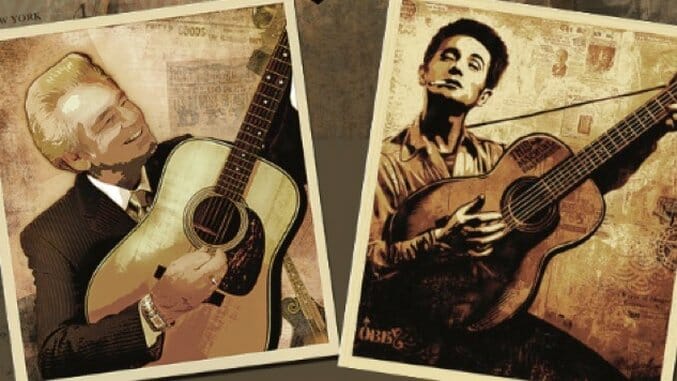Del and Woody: Two Grand Masters, One Groundbreaking Sound

No matter how many reviews you read that ballyhoo the just-released Del and Woody, you won’t appreciate its brilliance until you hear it.
Although Nora Guthrie, daughter of the iconic Woody, brought her father’s unfinished songs—lyrics, really—to bluegrass great Del McCoury, she credits destiny for joining the two musical forces. She points to the resulting album that is as much McCoury as Guthrie and nothing short of groundbreaking.
“That was my emotional reaction before I thought of this project because Del is the kind of guy he is. He’s the kind of people Woody grew up with in Oklahoma,” she says. “They were part of the bedrock of popular culture, of popular socialism. [Del] could easily be my uncle, a member of my family.”
Indeed, “The Grand Master,” as Nora Guthrie calls McCoury, is one of the few musicians she’s ever met who shares the same musical sensibilities, style and soul as her father. (For evidence of this, check out his excellent Daytrotter session.) Despite his dozens of awards including Grammys, his much-coveted membership in the Grand Ol’ Opry and his must-attend annual Memorial Day weekend DelFest that features some of the best Americana artists in the world (this year’s festival includes Tedeschi Trucks Band, Bruce Hornsby & the Noisemakers, Railroad Earth, Aoife O’Donovan and many others), he is one of the most respectful and self-effacing musicians in modern music.
“I’ve always known how talented my dad is, and this proves it again. I can’t tell you how proud I am of him,” says Ronnie McCoury, the award-winning mandolinist who is at the apex of his dad’s band. “The biggest names in music—from Bruce Springsteen to Bob Dylan—were influenced in some way by Woody’s music and for [Nora and Arlo Guthrie] to choose my dad to finish them is just mind-blowing. I am just so proud to see all of the accolades that have come to him.”
-

-

-

-

-

-

-

-

-

-

-

-

-

-

-

-

-

-

-

-

-

-

-

-

-

-

-

-

-

-

-

-

-

-

-

-

-

-

-

-








































